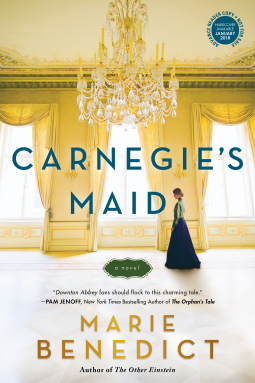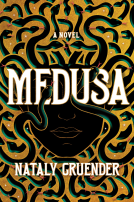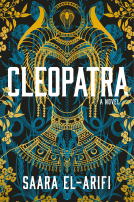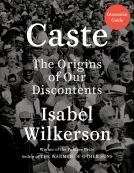
Carnegie's Maid
A Novel
by Marie Benedict
This title was previously available on NetGalley and is now archived.
Send NetGalley books directly to your Kindle or Kindle app
1
To read on a Kindle or Kindle app, please add kindle@netgalley.com as an approved email address to receive files in your Amazon account. Click here for step-by-step instructions.
2
Also find your Kindle email address within your Amazon account, and enter it here.
Pub Date Jan 01 2018 | Archive Date Feb 02 2018
SOURCEBOOKS Landmark | Sourcebooks Landmark
Description
From the author of The Other Einstein comes the mesmerizing story of love, power, and the woman who inspired an American dynasty.
In the industrial 1860s at the dawn of the Carnegie empire, Irish immigrant Clara Kelly finds herself in desperate circumstances. Looking for a way out, she seeks employment as a lady’s maid in the home of the prominent businessman Andrew Carnegie. Soon, the bond between Clara and her employer deepens into love. But when Clara goes missing, Carnegie’s search for her unearths secrets and revelations that lay the foundation for his lasting legacy.
With capturing insight and sunning heart, Carnegie’s Maid tells the story of one lost woman who may have spurred Andrew Carnegie’s transformation from ruthless industrialist into the world’s first true philanthropist.
Advance Praise
Feels like Downton Abbey in the United States…Benedict demonstrates the relevance of history to the present day in this impeccably researched novel of the early immigrant experience. Deeply human, and brimming with complex, vulnerable characters, CARNEGIE’S MAID shows the power of ambition tempered by altruism, and the true realization of the American Dream. -- Erika Robuck, national bestselling author of Hemingway’s Girl
In CARNEGIE’S MAID, Marie Benedict skillfully introduces us to Clara, a young woman who immigrates to American in the 1860s and unexpectedly becomes the maid to Andrew Carnegie’s mother. Clara becomes close to Andrew Carnegie and helps to make him America’s first philanthropist. Downton Abbey fans should flock to this charming tale of fateful turns and unexpected romance, and the often unsung role of women in history. -- Pam Jenoff, New York Times bestselling author of The Orphan’s Tale
Available Editions
| EDITION | Hardcover |
| ISBN | 9781492646617 |
| PRICE | $25.99 (USD) |
| PAGES | 288 |


















